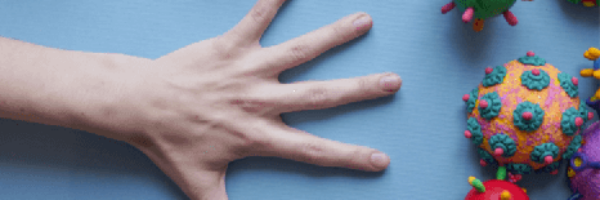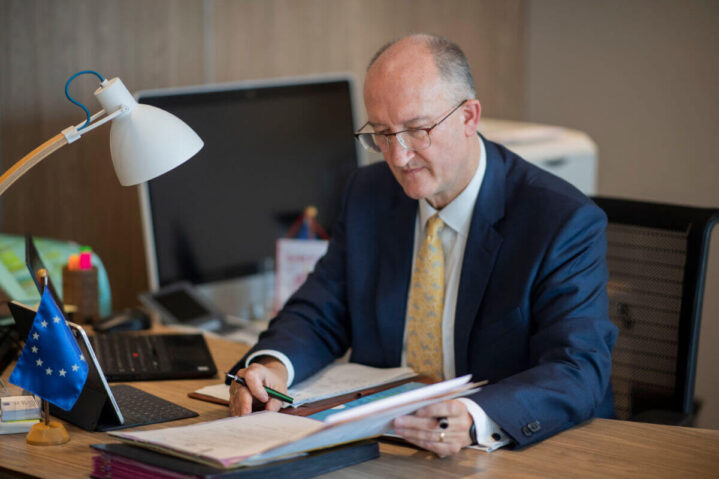
H.E. Mr. David Daly the European Ambassador to Thailand
Expat Life in Thailand were honoured to sit down and talk to the new European Union Ambassador David Daly. Personally, I was very pleased to see an Irishman take over the role from H.E. Mr. Pirkka Tapiola. We asked him about his past, his first impressions of Thailand and what his goals are for the future.
How long have you been the EU Ambassador to Thailand?
I arrived in Thailand at the end of August, and I presented my Letter of Credence to His Majesty King Maha Vajiralongkorn on 5 November. From that moment on I have been the EU Ambassador to the Kingdom of Thailand.
Did you arrive to Thailand direct from home, and or where were you posted before?
I came to Thailand from Brussels where the European Union’s headquarters are based, including the European External Action Service (EEAS) for which I work. The EEAS is the diplomatic service of the European Union; it brings together colleagues from the EU member countries’ diplomatic services with colleagues from the EU institutions, to create a new EU diplomatic service. It supports the common EU foreign and security policy and ensures the overall political coordination of the many external actions of the EU.
May I ask which city were you born and brought up in?
I come from County Sligo in the Northwest of Ireland – a very beautiful place with the sea, mountains, and lakes.
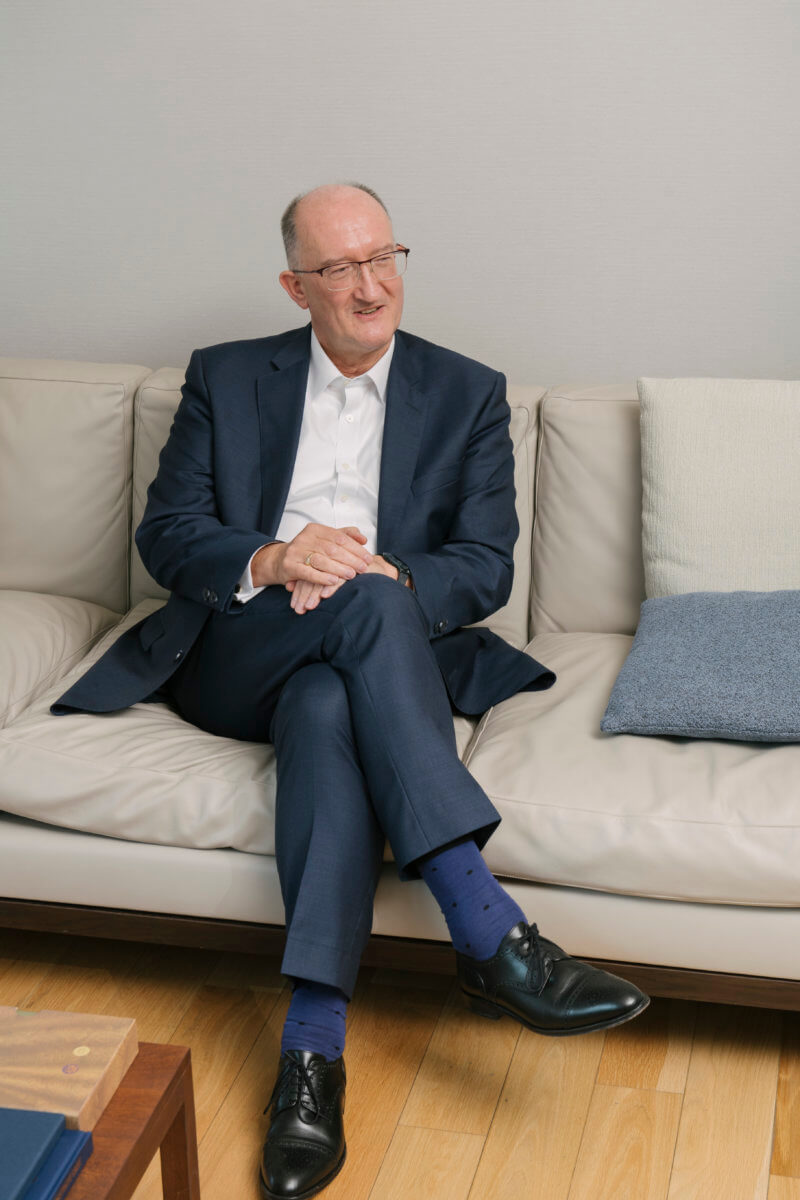
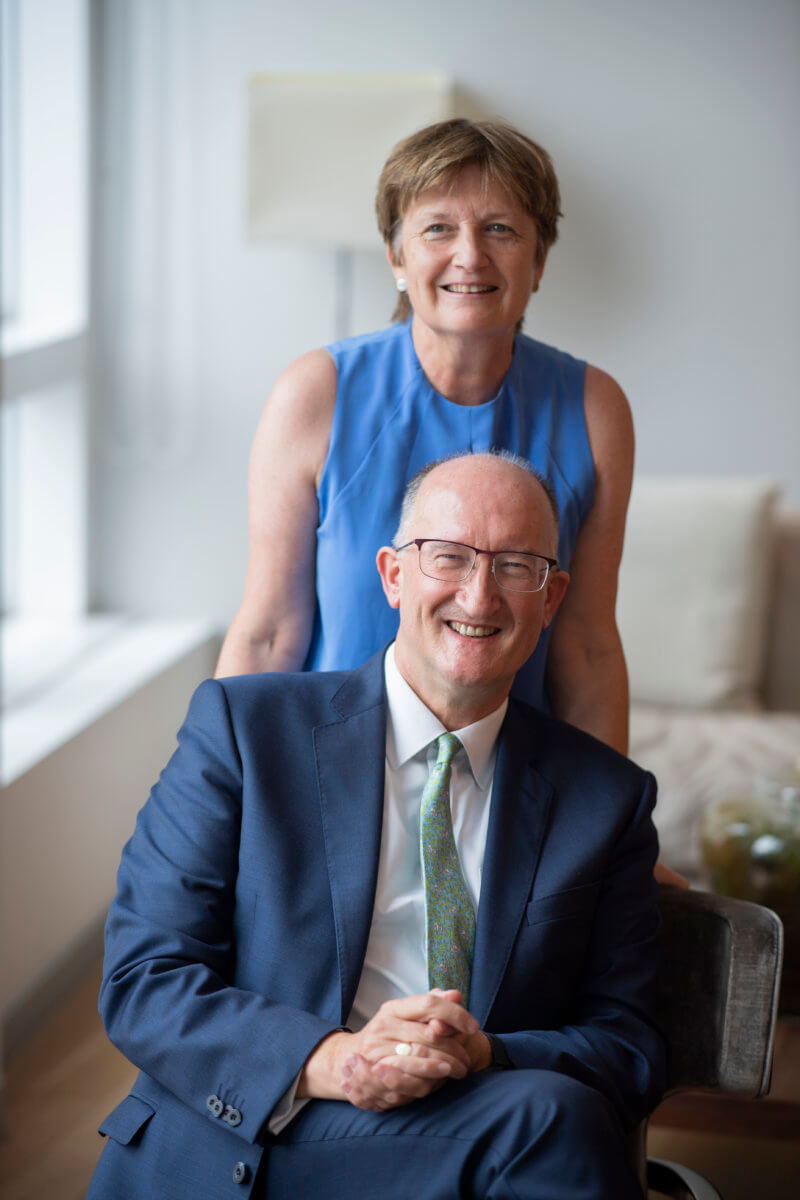
At which age did you decide you wanted to become a diplomat?
I have always had a wide range of interests including in history, geography, politics, and travel; this has led me to have a certain curiosity about what happens around the world and why. From an early age I was fascinated by my father’s stories of having taught English in Iraq after the Second World War. This was a good basis for being interested but I never said to myself “Now I want to become a diplomat”; it just became an opportunity after university, and I was lucky enough to be accepted into the Irish Diplomatic Service. From day one I have found it to be a fascinating career – and I still do today.
Are there any other diplomats in your family?
No, although many family members have worked abroad at various stages in their lives, in Britain and elsewhere in Europe, the Middle East, North America and Australia – something which is not unusual in Irish families.
How do you see Thailand today, in ASEAN, and in a wider context?
The European Union views Thailand as an important partner both bilaterally and regionally. The EU is Thailand’s 3rd ranked investment partner and 4th ranked trading partner. We do around €30 billion in trade each year, that’s around €600 million a week – this in turn creates jobs both in Thailand and in the EU. The same goes for investments – Thai companies investing in Europe and EU companies investing here in Thailand. Beyond trade and investment there are also many other shared priorities such as climate change and the environment, sustainable development, maritime security and fisheries issues, people-to-people contacts whether for tourism or for research and academic exchanges.
Politically also the EU recognises that Thailand is an important country in an important region. The EU leaders endorsed a new Strategy for Cooperation in the Indo-Pacific region a few weeks ago. This new strategy recognises the importance of the Indo-Pacific and invites cooperation with the EU on key priority areas such as sustainable and inclusive prosperity, green transition, ocean governance, digital governance and partnerships, connectivity, security and defence, and human security.
At the SE Asian level, Thailand has been supportive of a stronger cooperation between ASEAN and the EU over recent years. In late 2020, we launched the EU-ASEAN Strategic Partnership and a lot of the groundwork on this was done during the period when Thailand was the ASEAN coordinator for relations with the EU (2016-2019). Many priority issues in EU-ASEAN relations, including on sustainable development, are issues on which Thailand plays a leading role within ASEAN.
Do you see any similarities between the EU and Thailand?
Europe has a rich cultural heritage and many beautiful and interesting places to visit, as indeed has Thailand. Within the EU there are 27 different countries, each has its own wonderful specialties. Naturally, I look forward to discovering Thailand’s cultural heritage during my tenure here.
May I ask if you have children, if so, what age are they and where do they study or work?
My wife Aideen and I have three children, two boys Seán (29 years) and Aiden (26 years), and our daughter Ceola (21 years). Both the boys are working, Seán in London, Aiden in Dublin. Ceola is in her final year of university doing a degree in English and Drama at Dublin University, Trinity College.
How do you look upon your work here? How does an average day look like?
The work is interesting, intensive, and important. The average day is generally not routine because even if one has planned various meetings and/or events, there are always urgent issues which come up unexpectedly. I have found it the same in the other diplomatic missions in which I have served – India, Hungary, Australia, and Sri Lanka – I am sure that it is the same for diplomats everywhere. There is a constant dynamism in international relations.
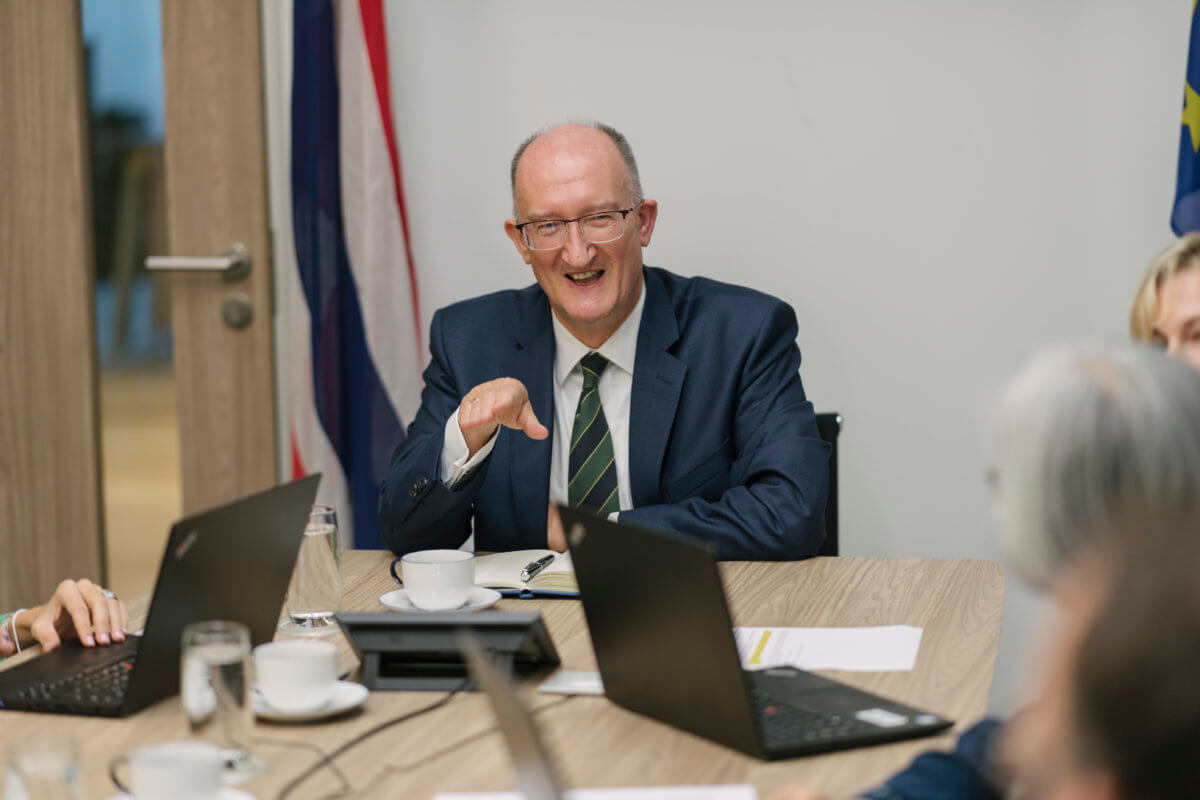
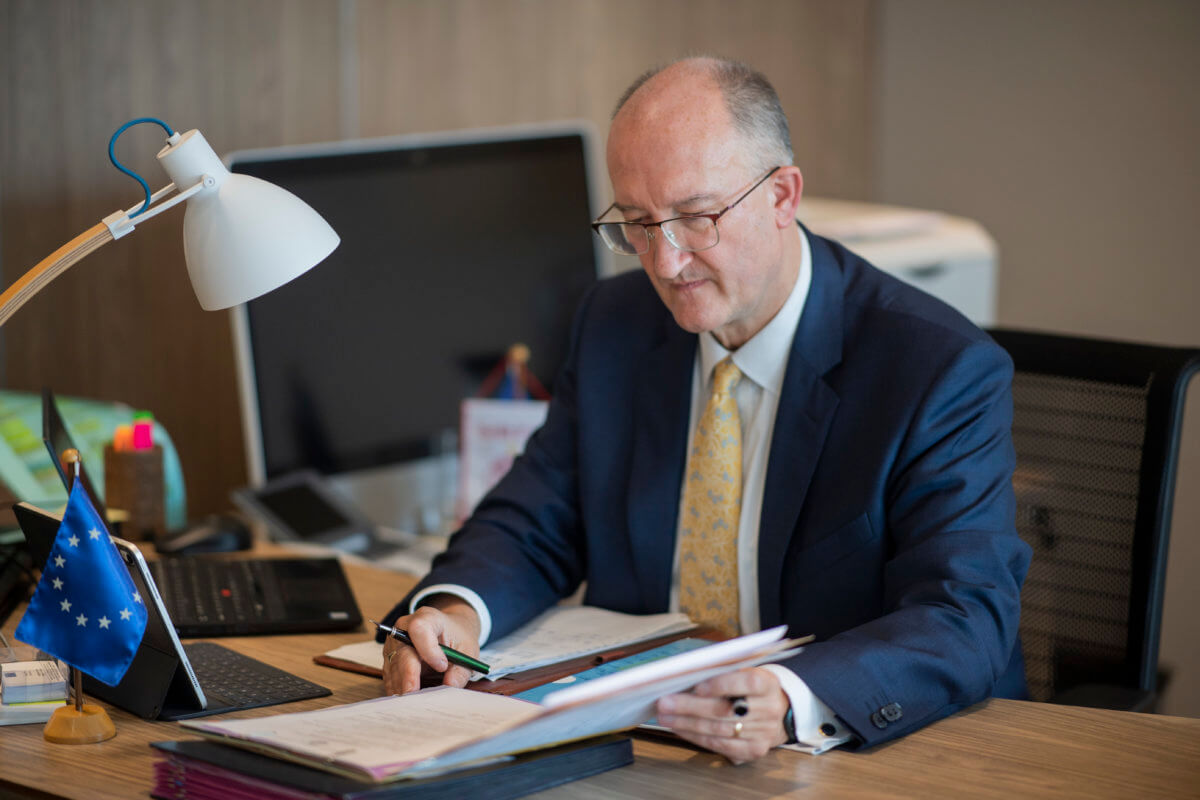
Have you set some goals you really would like to fulfil before you leave Thailand?
Recognising the important progress made by my predecessor Ambassador Tapiola in this respect, I nonetheless want to build an even stronger relationship between the EU and Thailand. In diplomacy we often work for the benefit of our successors; we invest our energy in creating a framework for better cooperation which yields its rewards after we are gone. I very much hope that during my term we will have signed our Partnership and Cooperation Agreement, that we will have resumed our negotiations on an ambitious Free Trade Agreement and be well advanced in them, and that we have further strengthened our cooperation across the board, including on human rights issues, as well as on regional and global issues such as climate change, oceans’ governance, maritime and cyber security, and digitalisation, to name just a few.
Have you managed to travel in Thailand yet?
Aideen and I recently visited the beautiful island of Phuket for a long weekend. The EU has some projects on sustainable development and maritime littering which benefit Phuket. We greatly enjoyed our stay and would like to return. However, we are very conscious that there are many such wonderful places in Thailand to visit, whenever time and the restriction on travel allows.
When you have a day off, what do you prefer to do? Any hobbies or pastimes?
On a day off Aideen and I like to explore Bangkok. We have seen some beautiful Wats and interesting markets. We know that there is still plenty for us to discover. When not exploring we like to read, listen to music, play badminton and other sports. We were delighted to discover that there is a Gaelic Football Club in Bangkok – this is a very special type of football native to Ireland, not soccer, not rugby – perhaps lessor known, but much better!
Have you any idea how many Europeans from the 27 countries are living in Thailand? Why did Thailand become such a desirable destination?
Many tens of thousands of Europeans live in Thailand on a long term basis and many more come as tourists each year, pre-Covid. With its famous cuisine, beautiful beaches, temples and diverse and scenic countryside, as well as its year round tropical temperatures, it is easy to see how Thailand is an attractive tourist destination. We all hope for a continued improvement in the Covid situation enabling movement restrictions to be further eased.
Do the EU countries that you represent, and Thailand have exchange programmes for students?
The EU offers one of the world’s largest scholarship programme called the Erasmus+ which enables student and academic exchanges between EU and partner countries’ institutions. We encourage future generations to think beyond national borders with an international outlook. The International Credit Mobility Programme under the Erasmus+ has welcomed over 1,500 Thai participants since 2015, while close to 400 Thai students have been awarded the Erasmus Mundus Joint Master Degree (EMJMD) scholarships so far. At the same time, Erasmus+’s Capacity Building in Higher Education projects (CBHE) support collaboration between institutions, particularly the smaller higher education Institutions and universities.
Apart from our scholarship, we also have the Marie Skłodowska-Curie actions, which give funding to researchers regardless of their nationality and foster cooperation with European research institutes. These EU exchange programmes are in addition to those of the EU member states.
Any experience in Thailand so far that you would like to tell us about?
One very special moment was a sunset cruise on our recent trip to Phuket – just magical!
Do you regularly meet up with your community?
All the Ambassadors of the EU member states have constant contact with their nationals based in Thailand. As the EU Ambassador I am always ready to support them whenever they would wish for the broader EU perspective to be brought to their nationals’ attention.
We wished David well and hope that he has a useful, happy, and creative posting in Thailand and wait for further developments and announcements soon…


